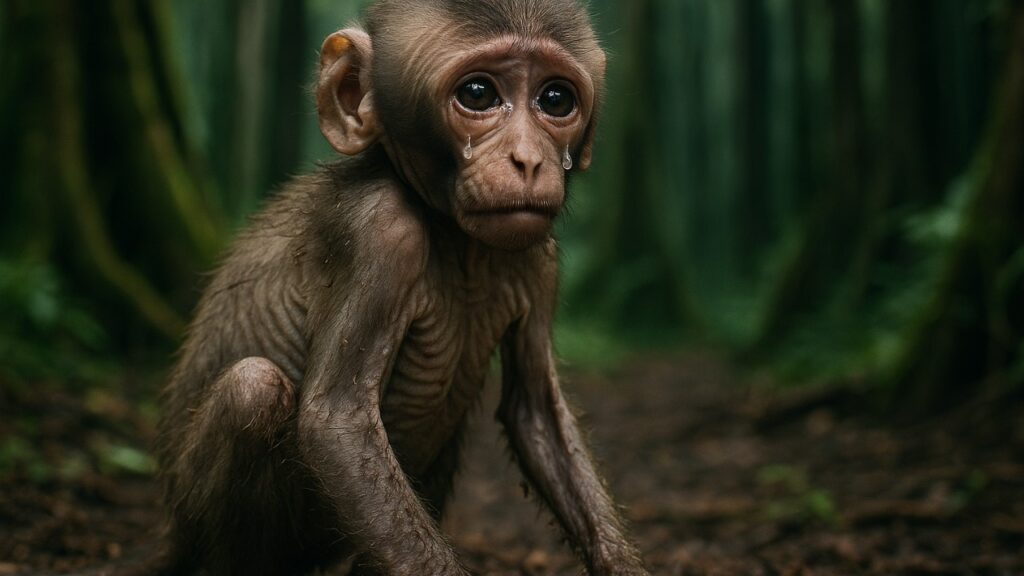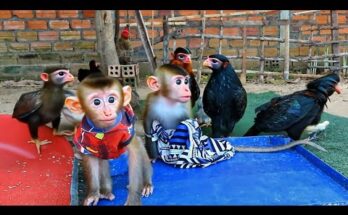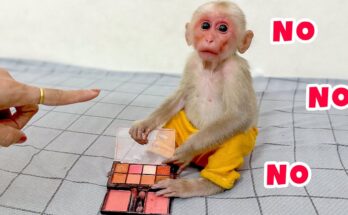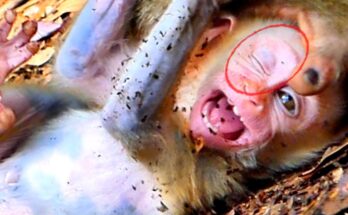
Tiko was found clinging to a tree branch, too weak to move and crying softly for his mother. Luckily, the kind rescuers from the sanctuary spotted him during their patrol. They gently wrapped him in a soft blanket and brought him to the safety of the monkey rescue center.
At the sanctuary, Tiko met other orphaned baby monkeys like Mimi, Bobo, and Yula. Some were even younger than he was. The caretakers became their new family. These humans didn’t speak monkey language, but they understood what the babies needed — warmth, milk, love, and patience.
During the first few weeks, the baby monkeys were fed special milk from bottles, just like human babies. Some of them were too scared to eat at first. They had never been without their mothers. But with gentle cuddles and soft words, the caregivers made them feel safe again.
Tiko, still small and scared, found comfort in holding the caregiver’s finger tightly, just like he would have held his mother’s fur. At night, he was wrapped in a warm blanket and rocked to sleep. The other baby monkeys huddled together for warmth and comfort, forming bonds just like a real monkey family.
As the weeks passed, the babies began to grow stronger. They started to climb on ropes, swing on small branches, and nibble on fruits. But survival was not just about eating — it was about learning how to be monkeys.
That’s when the older orphan monkeys, like clever Naru and brave Tilla, stepped in. Though still young, they had learned many jungle skills and now became the “big siblings” to the new orphans.
Naru showed Tiko how to peel a banana and crack open a hard seed. Tilla taught Mimi how to leap from branch to branch safely. The babies watched and copied, just like they would have with their mothers in the wild.
Even playtime had purpose. Through chasing, tumbling, and tugging at each other, they learned balance, strength, and social behavior. When one monkey got too rough, the others squealed and ran away — a clear lesson in respecting others’ space.
Over time, the orphan babies became confident. They no longer cried for their mothers but looked to each other for support. Tiko had made close friends. He followed Naru everywhere and even helped little Yula when she couldn’t reach the top of the climbing post.
The sanctuary team continued to care for them, but from a little distance now. It was important for the monkeys to bond with each other more than with humans — because one day, if they grew strong and skilled enough, they might return to the wild.
That day came for Naru. He had grown into a strong, smart young monkey. With careful planning, the sanctuary team brought him to a safe forest area where other monkeys lived freely. Tiko watched as Naru climbed a tall tree and vanished into the green. It was sad to say goodbye, but it gave Tiko hope. One day, he too might be ready.
Learning to survive as an orphan monkey wasn’t easy. It took time, patience, and love. But with the help of kind humans and their monkey family, the babies learned how to eat, climb, communicate, and protect themselves.
Each monkey carried a little sadness from their past. But in their eyes now was a new spark — the will to live, the strength to grow, and the courage to face the world, one swing at a time.
And for little Tiko, swinging with his friends under the golden sunset, life finally felt full of possibility again.


